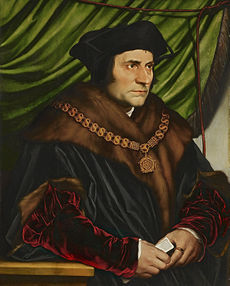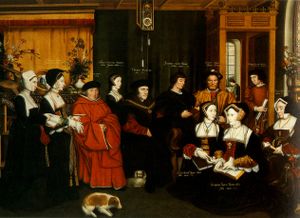Томас Мор

Sir Thomas More (1478–1535), saint, statesman, scholar, and author, was an incarnation of El Morya, who had been Thomas Becket in a previous life. He served as Lord Chancellor of England under King Henry VIII, the reembodied Henry II. Once again they were given the choice to serve God’s will or man’s will.
More discharged his duties wisely and well, but was beheaded because he failed to support the king in his departure from the laws of the Church regarding his marriage to Ann Boleyn.
Early life
Томас Мор, ныне воспетый как "человек на все времена", родился в 1478 году в самом сердце Лондона. Его отец, видный адвокат и судья, дал ему превосходное образование. В восемнадцать лет Томас Мор покинул Оксфорд, обладая глубоким знанием классики - античных языков и литературы, и посвятил себя изучению закона.
Юный Томас был близким другом выдающегося голландского гуманиста Эразма Роттердамского и пользовался благосклонным вниманием короля Генриха VIII, который привлекал его к деятельности в зарубежных миссиях. Занимаясь литературой, Мор снискал себе славу первого писателя изящной словесности в английской прозе за свое произведение "Жизнь Ричарда III", точный исторический документ, которому Шекспир следовал буквально в деталях.

Глубокая преданность Мора Богу побудила его одно время задуматься над религиозным призванием и практиковать необычайно строгий аскетизм в течение более четырех лет, дабы испытать собственную самодисциплину. Однако он решил жениться, и его жена и четверо детей оказались самой большой его радостью и единственным утешением в днях грядущих. Их известное поместье в Челси давало приют всей семье Томаса, включая одиннадцать внуков. Спустя годы "маленькая Утопия" Мора, как он часто называл ее, стала центром образования и культуры - Эразм уподоблял ее "платоновской академии", - обиталищем благой воли, куда приходили самые образованные люди того времени, даже сам король, за советом и утешением. В Челси Мор написал знаменитое произведение, озаглавленное "Утопия", остроумное обличение бессодержательной английской жизни и грубых пороков английского закона.
In 1529, Sir Thomas More was appointed by Henry VIII Lord Chancellor of England. Of him Erasmus wrote: “In serious matters no man's advice is more prized, while if the king wishes to recreate himself, no man’s conversation is gayer. Often there are deep and intricate matters that demand a grave and prudent judge. More unravels them in such a way that he satisfies both sides.”
In spite of many honors and achievements, More sought no man’s esteem. He remained sensitive to the needs of the common people by daily walking the back streets of London to inquire into the lives of the poor. And even as Lord Chancellor, it was his daily custom to enter the court of judges at Westminster Hall where his father sat, to kneel, and to ask his blessing.
Conflict with the king
Sir Thomas devoted himself to his duties with utmost zeal until Henry, desirous of but lacking a male heir to the throne, declared his marriage to Catherine of Aragon null and announced his intent to marry Ann Boleyn. Since the divorce was without Papal approval and directly opposed to the laws of the Church, More refused to support the king’s decision. He resigned his office and retired to Chelsea where, greatly concerned with the heresies of Luther’s revolt, he continued his writings in defense of the Catholic faith.
Without friends and without office, More and his family lived in abject poverty. Nevertheless, Henry had been insulted at the chancellor’s public disapproval of him. The king, therefore, sought to defame More and thus restore his royal image. When Sir Thomas clearly refused to give the oath of supremacy to Henry as head of the new Church of England, he was imprisoned in the dread Tower of London. Badgered by king’s lawyers, More staunchly refused to compromise the position of the Church but diplomatically avoided direct accusation of the king, thereby saving his life and remaining a testimony to Henry’s sinful injustice.
Finally, however, jealous enemies were encouraged by Henry to lie against him in the chancellor’s own court at Westminster. Charged and convicted of high treason, Thomas More was beheaded on Tower Hill in 1535. Kneeling before the executioner, he said, “I die the king’s loyal subject but God's first.”
Legacy
Sir Thomas More was beatified by the Roman Catholic Church in 1886 and canonized in 1935.
More’s most famous work, Utopia, is an attempt to depict an ideal society, one in which men live in harmony under the holy will of the Most High God.
The motion picture based on the play by Robert Bolt, A Man For All Seasons, is the story of the life of Sir Thomas More.
An ironic footnote to this episode is that in 1538 Henry VIII had the shrine of Saint Thomas Becket broken to pieces. After so many centuries he had never forgiven Becket. Henry ordered Becket’s name erased from the prayer books and prohibited any images of Becket in England.
Sources
El Morya, The Chela and the Path: Keys to Soul Mastery in the Aquarian Age.
Elizabeth Clare Prophet, February 17, 1990.
